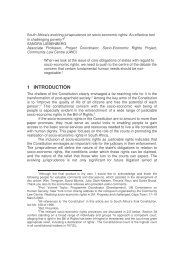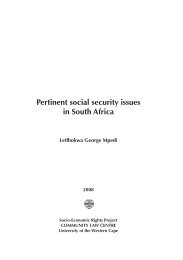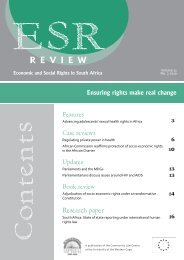ESR Review Volume 11 No 1 - January 2010 - Community Law Centre
ESR Review Volume 11 No 1 - January 2010 - Community Law Centre
ESR Review Volume 11 No 1 - January 2010 - Community Law Centre
You also want an ePaper? Increase the reach of your titles
YUMPU automatically turns print PDFs into web optimized ePapers that Google loves.
5<br />
practices with the ICESCR but also force the courts to take<br />
relevant international law principles more seriously.<br />
Fourth, ratification of the ICESCR will correct any distortions<br />
that may arise from South Africa’s currently incomplete<br />
recognition of some rights or from any legislation<br />
and policies that are not in line with international human<br />
rights standards. An objection by South Africa to ratifying<br />
the ICESCR has been that the constitutional Bill of Rights<br />
provides sufficiently for socio-economic rights. However,<br />
as mentioned above, the scope of some of the rights such<br />
as education is quite restrictive. Ratification of the ICESCR<br />
would result in South Africa extending the scope of benefits,<br />
for instance, in relation to the right to education and<br />
work, in order to better provide for the poor, marginalised<br />
and vulnerable.<br />
Furthermore, the ratification and subsequent implementation<br />
process involves the inspection of all existing<br />
legislations and policies in order to align them with the<br />
provisions of the ICESCR. As a consequence, laws and policies<br />
that run counter to the spirit and purpose of the ICE-<br />
SCR and subsequent interpretations by, for instance, the<br />
CESCR will have to be repealed or amended.<br />
Why ratify the OP-ICESCR<br />
In addition to bringing greater coherence to the international<br />
human rights system, the OP-ICESCR promotes the<br />
culture of accountability and helps empower poor, vulnerable<br />
and marginal groups, and both of these objectives<br />
are encouraged by the South African Constitution. The<br />
OP-ICESCR opens up avenues for combating poverty by<br />
providing a mechanism through which accountability for<br />
poverty can be strengthened and abuses linked to poverty<br />
can be identified and addressed.<br />
South Africa played a crucial role in the adoption of<br />
the OP-ICESCR, making significant efforts to ensure that<br />
it affirmed and built on the African experience and did not<br />
weaken it by setting a lower standard of review at the international<br />
level. During the discussions on the OP-ICESCR,<br />
South Africa presented its experience in enforcing socioeconomic<br />
rights through the courts, and this informed the<br />
text of the OP-ICESCR, particularly article 8(4). Considering<br />
South Africa’s role in the adoption of the Protocol and<br />
its enforcement of socio-economic rights at the national<br />
level, it is logical for South Africa to become a party to the<br />
OP-ICESCR. However, South Africa will only be able to ratify<br />
the OP-ICESCR after it ratifies the ICESCR. As a result,<br />
ratification of the OP-ICESCR has not really been an issue<br />
in the South African context. <strong>No</strong>twithstanding this, it is important<br />
to point out some of the benefits of such a step.<br />
First, ratification of the OP-ICESCR would serve to<br />
strengthen the domestic protection of socio-economic<br />
rights through policy, legislation and jurisprudence. Article<br />
3 of the OP-ICESCR requires the exhaustion of all available<br />
domestic remedies (judicial and quasi-judicial) before<br />
a complaint can be heard by the CESCR. This encourages<br />
the use, development and strengthening of mechanisms<br />
at the national level for the enforcement of these rights.<br />
Though socio-economic rights are already justiciable in<br />
‘<br />
‘<br />
The OP-ICESCR facilitates<br />
international assistance for states<br />
with serious resource constraints.‘<br />
‘<br />
South Africa, it is important to provide victims with the<br />
choice of approaching an international body where they<br />
have not been able to obtain an appropriate remedy from<br />
the courts. Moreover, ratification of the OP-ICESCR would<br />
illustrate South Africa’s acceptance of enhanced accountability<br />
by giving the CESCR the authority to receive complaints<br />
and give its views and recommendations on addressing<br />
the challenges identified.<br />
Second, the OP-ICESCR enhances states’ compliance<br />
with the ICESCR. Through the communications and inquiry<br />
procedures, the government would be encouraged to take<br />
steps towards the full incorporation of the ICESCR into domestic<br />
law and policies and the effective implementation<br />
of the rights contained in it. Individual complaints mechanisms<br />
at the international level have been associated with<br />
rights improvements. ‘The possibility that an individual<br />
right of standing before a body of experts helps improve<br />
rights outcomes on average provides a strong rationale for<br />
ratification’ (Simmons, 2009: 66, 81).<br />
Third, the OP-ICESCR facilitates international assistance<br />
for states with serious resource constraints. The<br />
South African Constitution, like the ICESCR, recognises<br />
that the full implementation of socio-economic rights<br />
is dependent on resources. The OP-ICESCR encourages<br />
and facilitates international assistance and cooperation<br />
and also provides for the establishment of a fund. These<br />
would assist states facing serious resource constraints in<br />
implementing the CESCR’s views and recommendations.<br />
Also, as the CESCR pointed out in General Comment 2<br />
on international technical assistance measures (UN doc.<br />
E/1990/23, para 10), states have the opportunity under article<br />
22 of the ICESCR to identify in their reports any particular<br />
needs they might have for technical assistance or<br />
development cooperation.<br />
Fourth, ratification of the OP-ICESCR will enable South<br />
Africa to assume a leading role in human rights at the African<br />
regional level. Failure to ratify the OP-ICESCR would<br />
detract from the gains made thus far in the African region<br />
and by South African courts in protecting socio-economic<br />
rights as justiciable rights.<br />
Post-ratification<br />
Three months after South Africa deposits its instrument of<br />
ratification or accession to the ICESCR and the OP-ICESCR,<br />
they will enter into force (article 27(2) of the ICESCR and<br />
18(2) of the OP-ICESCR). However, if South Africa’s ratification<br />
of the OP-ICESCR occurs before it enters into force,<br />
its entry into force for South Africa will be three months<br />
after the deposit of the tenth instrument of ratification or<br />
accession (article 27(1) of the OP-ICESCR). It is important<br />
to note that an international treaty becomes law in South<br />
<strong>ESR</strong> <strong>Review</strong> Vol <strong>11</strong> <strong>No</strong>. 1 <strong>2010</strong>
















